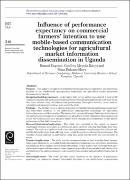Influence of performance expectancy on commercial farmers’ intention to use mobile-based communication technologies for agricultural market information dissemination in Uganda

View/
Date
2016-06Author
Engotoit, Benard
Mayoka Kituyi, Geoffrey
Bukoma Moya, Musa
Metadata
Show full item recordAbstract
This paper to examine the relationship between performance expectancy and behavioural
intention to use mobile-based communication technologies for agricultural market information
dissemination in Uganda.
Design/methodology/approach – A descriptive field survey method was adopted. A total of 302
commercial farmers and agribusiness traders in Eastern Uganda participated in the study from whom
data were collected using self-administered questionnaires. Descriptive statistics, factor analysis,
correlation and regression analyses were used in the study.
Findings – The findings reveal a significant positive relationship between performance expectancy
and behavioural intentions to use mobile-based communication technologies for agricultural
information access and dissemination. This implies that, commercial farmers’ behavioural intentions to
use mobile-based communication technologies for agricultural market information dissemination and
access will be influenced if they anticipate mobile-based communication technologies to offer greater
performance in their daily transactions.
Research limitations/implications – This study was conducted in the context of resource
constrained countries particularly in sub-Saharan Africa, however reflecting knowledge from other
contexts. The study was conducted with a structured questionnaire being the main data collection tool,
and this limited the study from collecting views outside the questions asked in the questionnaire. The
variables studied could not be analysed for a long time, given that the study was cross-sectional in
nature.
Practical implications – The study provides recommendations on how to further boost farmers’
behavioural intentions to use mobile-based communication technologies for agricultural information
dissemination. Policy makers need to ensure that policies are put in place that encourage third party
software developers and telecommunication companies to provide software products and solutions that
are beneficial to the commercial farmers and can enable them complete their agricultural transactions in
time.
Social implications – The study provides critical literature on the influence o f performance
expectancy on commercial farmers’ behavioural intentions to use mobile-based communication technologies for agricultural market information access and dissemination in resource constrained
settings.
Originality/value – It is noted that farmers in Uganda are slowly progressing to newer mobile
information and communication technology tools for market information access and dissemination;
however, little is known as to why there is slow adoption of these mobile technologies for agricultural
purposes; yet policy makers need to come up with proper strategies to encourage wide scale use of
mobile technologies for agricultural market purposes.
